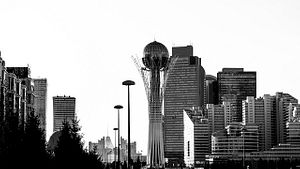A court in Kazakhstan has upheld the conviction of Alnur Ilyashev, who was found guilty of spreading “false information” amid the coronavirus pandemic. The “false information” was his opinions about the Kazakh government’s handling of the pandemic. The case underscores the flexibility of “fake news” laws and illustrates their general use to quash dissent.
In June, Ilyashev was found guilty of the “dissemination of knowingly false information that threatens public order during the state of emergency.” Kazakhstan’s state of emergency ran from March 16, after the country recorded its first COVID-19 case, to May 11.
Ilyashev was sentenced to three years of restricted freedom and banned from social or political activism for five years.
As I wrote in June:
What false information landed Ilyashev in so much trouble? Simply his opinion, stated online. In late March, Ilyashev made a series of Facebook posts critical of the government’s pandemic responses. He criticized First President Nursultan Nazarbayev’s appeal for businessmen to pool funds to fight the virus. “A mountain gave birth to a mouse,” he quipped, noting that Kazakhstan’s richest had only managed to put together $41 million. In another post, he called Nur Otan — Kazakhstan’s ruling party, founded and run still by Nazarbayev — a party of “crooks and thieves.”
On April 17, Ilyashev was arrested. The authorities alleged that his online statements “endangered public order” during the state of emergency. (Kazakhstan’s state of emergency ran from March 16 to May 11). Ilyashev’s posts, the authorities argued, would cause the public “to be alarmed.”
On May 12, the day after Kazakhstan’s state of emergency was lifted, Kazakhstan had reported 5,279 cases of COVID-19 and 32 deaths. In the four months since, and after beginning to include asymptomatic carriers who tested positive as actual COVID-19 cases, Kazakhstan’s total case number has ballooned to 106,920 cases and 1,634 recorded deaths.
The Kazakh government’s position that Ilyashev’s posts would alarm the public is absurd. First, a deadly pandemic caused by a virus that can be spread through the air by asymptomatic carriers is what’s alarming. Second, if misinformation were the real worry for Kazakh authorities there have been plenty of other targets.
Anastassiya Fershtey wrote for The Diplomat on July 10 how various conspiracy theories and misinformation was spreading through Kazakh social media. “Bloggers flood social media news feeds with conspiracies; meanwhile fake treatment regimes, unsupported by the WHO, circulate on instant messaging platforms, promising full recovery from the disease,” she wrote.
A good number of conspiracy theories and false information were shared by Kazakh celebrities, as Katia Patin wrote for Coda Story in mid-July. A rapper told her Instagram followers that an unnamed “they” were spraying the virus from helicopters; a singer said the United States was spreading the virus via regional research laboratories. “Fake cures such as eating lamb fat, drinking vodka or blue iodine are shared by social media users, while the nation suffers from shortages of paracetamol, antibiotics and thermometers.”
It’s not clear whether any of the celebrities covered in the article were censored, fined, or punished for their public airing of false information.
This divergent treatment of Ilyashev and the various social media “influencers” and celebrities can be brushed aside by noting that his posts were made during the state of emergency and theirs after. But that’s a thin veil to hide behind and it doesn’t obscure the reality that what Kazakh authorities are uncomfortable with is criticism of the government, not “false information.”
Heather McGill, Amnesty International’s Central Asia researcher said in June when Ilyashev was sentenced that “The Kazakhstani authorities have shamelessly exploited the state of emergency that was called to deal with the COVID-19 pandemic to clamp down on voices of dissent. Alnur Ilyashev has committed no crime. He has only expressed his opinions peacefully which the authorities and their ‘experts’ have portrayed as a criminal act and severely penalized.”

































